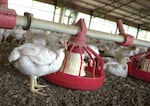Oregon agriculture regulators are proposing a modified permit for a large-scale facility looking to raise 3.4 million broiler chickens per year near Scio in Linn County. The decision follows yearslong pushback from local farmers and residents.
In April, the Oregon Department of Agriculture and Department of Environmental Quality had temporarily withdrawn a Confined Animal Feeding Operation, or CAFO, permit sought by J-S Ranch. The state departments pulled the permit for reconsideration, ahead of a court challenge scheduled to go to trial in May.
A coalition of farmers and residents filed that challenge, arguing the site is an inappropriate location to build 11 large barns and raise millions of broiler chickens for Foster Farms as J-S Ranch plans to do.

In this file photo taken June 19, 2003, chickens gather around a feeder in a Tyson Foods Inc., poultry house near Farmington, Ark. Tyson Foods said Tuesday, April 28, 2015.
April L Brown / AP
People opposing the large farm say the proposed site floods easily, that it would produce tons of manure and harmful gasses and they fear it could pollute the nearby North Santiam River — a tributary to the Willamette River.
Opponents were asking the Linn County circuit court to reverse the farms’ CAFO permit, which is intended to protect surface and ground water by limiting the amount of manure, wastewater and nutrients that can be discharged from a farm.
The owner of the farm, Eric Simon, has said the chicken litter and manure will be sold to other farmers for fertilizer.
Now, in an August 16 public notice, the state announced it’s proposing to issue J-S Ranch what’s called a National Pollutant Discharge Elimination System, or NPDES individual CAFO permit. While that permit includes some stronger requirements, like underground moisture sensors to test for nitrates, opponents say not much else is different from the original permit the state issued in 2022.
Christina Eastman, a farmer who lives next door to the proposed site and is a member of the coalition Farmers Against Foster Farms, said the decision is surprising.
“They [the state] know the community doesn’t want it, yet they keep pushing it,” she said. “Their decision to move forward is astounding, irresponsible and downright negligent.”
The state’s lead agency on the permit, the Oregon Department of Agriculture, did not respond to OPB’s request for comment.
Commercial chicken industry groups have said Pacific Northwest chicken farms can’t keep up with demand. They say most of the chicken that’s sold and consumed in the Northwest is trucked in, which is why they’ve looked for sites in Oregon.
Eastman said she doesn’t buy that argument.
“When was the last time you went to the supermarket and couldn’t find chicken?” she said. “People would rather spend a few extra cents than live next to these things and have them pop up in your community, by your river, by your creek, next to your farm, next to your schools.”
Industry groups have also pointed to another already existing large chicken farm permitted to house up to 4.2 million chickens per year in Linn County. They note that it’s never received a violation from the state.
Groups opposing the proposed farm say they will likely go back to court to block the CAFO permit, if it’s approved.
The state’s announcement, however, does not mean the owner of J-S Ranch can begin construction. The Oregon Department of Agriculture will hold a virtual public hearing on Sep. 16 and accept written comments until Sep. 23. After that, state agriculture officials will consider whether to officially issue the modified CAFO permit.
